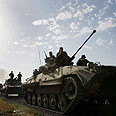
Georgia awaits evidence of ceasefire
Despite signing of ceasefire agreement authorities claim no truce is evident in field; Russian troops reportedly looting cities, digging foxholes and advancing tanks. Earlier, US condemned Russian invasion as unacceptable by democratic nations
Despite the recent signing of a ceasefire between Georgia and Russia, the streets of South Ossetia and its region did not appear peaceful on Saturday as Russian troops made their deepest incursion into Georgian territory since the conflict began last week. Eyewitnesses reported enemy soldiers were digging foxholes on the outskirts of Georgian cities, and reports of looting and killing by Ossetians and Russian troops were also abundant.
One report said armed Ossetians had escorted a group of about two dozen Georgian civilians through the streets of the South Ossetia's capital, Tskhinvali. Russian officers claimed the civilians are Georgians who are being forced to clean the roads. South Ossetian officials say about 80 percent of the city's 30,000 residents fled Tskhinvali during the fighting, which caused heavy damage.
Another report said Russian forces blew up a railway bridge located 40 kilometers west of Tbilisi, which connects the capital to the city of Gori. A Georgian Interior Ministry spokesman said the explosion paralyzed the country's locomotive transportation. But Russia's General Staff denied troops had blown up the bridge.
"We are now in peacetime. Why should we be blowing up bridges when our job is to restore?" Colonel-General Anatoly Nogovitsyn, deputy chief of the General Staff, told a daily official military briefing. "This therefore can only be yet another completely unverified statement. We are not conducting bombardments. I can say with full responsibility that this cannot be the case."

Russian troops show no signs of withdrawal. (Photo: Reuters)
Closing the deal
The Kremlin announced Saturday that Russian President Dmitry Medvedev signed the plan for a cease-fire in Georgia. The move came a day after Georgian President Mikhail Saakashvili reluctantly signed the plan that calls for Russian troops to pull back, but that also grants them limited patrols inside Georgia.
The plan appears to leave some tense issues open to interpretation, including whether Georgia will be able to send troops back into parts of South Ossetia. Russia had demanded to see the Georgian president's signature on the deal before it was willing to sign.
Late on Friday US Secretary of State Condoleezza Rice spoke with Russian Foreign Minister Sergei Lavrov from her plane after leaving the Georgian capital Tbilisi. A US official said Lavrov told Rice Russia would faithfully implement the ceasefire agreement, but wanted to see Saakashvili's signature on the document first.
On Thursday about 17 armored personnel carriers and about 200 soldiers advanced to a village 45 km (30 miles) from Tbilisi, the deepest drive into Georgian territory since fighting began in Georgia's breakaway region South Ossetia on Thursday.
Saakashvili said tanks also advanced on another two towns, Khashari and Borjomi, in central Georgia, but that could not be independently verified. A reason for the presence of Russian armor maneuvering inside Georgia in either case was not immediately clear.
The US president condemned Russia's actions late Friday, and said, "The world has watched with alarm as Russia invaded a sovereign neighboring state and threatened a democratic government elected by its people. This act is completely unacceptable to the free nations of the world." Bush was making his weekly Saturday radio address, which the White House released on Friday.
'No longer 1968'
The United States earlier demanded Russian troops end their occupation of Georgia immediately after Georgia signed the ceasefire agreement.
Speaking alongside Saakashvili in Tbilisi, Rice evoked the Soviet-led invasion of Czechoslovakia 40 years ago: "Russian forces need to leave Georgia at once. This is no longer 1968." Saakashvili met with Rice for five hours.
Saakashvili, in passionate remarks, denounced Russians as "21st century barbarians" and blamed the West for triggering the crisis by failing to react firmly to Moscow's previous military moves and not admitting Georgia to NATO fast enough.
"Who invited the trouble here?" he said, flanked by several large Georgian and US flags. "Not only those people who perpetrated this, but those who failed to stop it."










